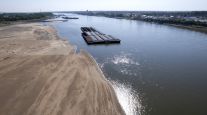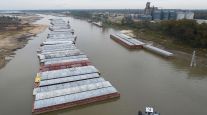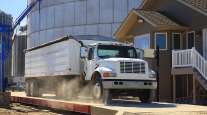Staff Reporter
New Iowa Truck Road Unveiled at Missouri River Barge
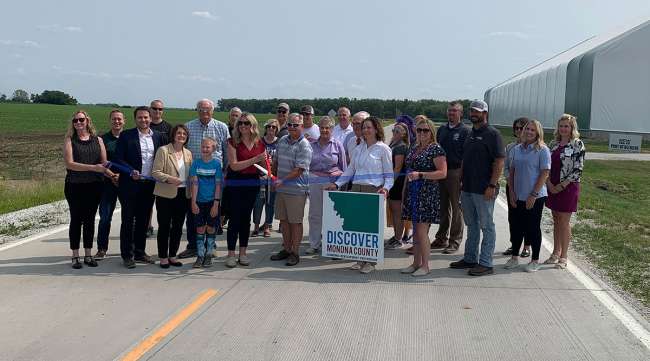
[Stay on top of transportation news: Get TTNews in your inbox.]
A new rural freight road partially funded by a $1 million U.S. Department of Commerce grant is enabling farmers to move agricultural freight from Interstate 29 directly to Iowa’s Port of Blencoe barge terminal on the Missouri River.
A recent ribbon-cutting at the site was attended by Angela Belden Martinez, regional director of the Denver office of the U.S. Economic Development Administration, Iowa officials and the port’s owner/operator, the NEW Cooperative Inc., to hail completion of the road.
In 2021, U.S. Secretary of Commerce Gina Raimondo announced the $1 million grant to Monona County for road improvement access to the barge port. “This EDA investment in Monona County will provide agricultural businesses with better access to goods, transportation and markets as well as infrastructure for future businesses while supporting job opportunities,” she said at the time.
A key goal of the project was to facilitate easier access to the terminal for farmers and agribusinesses, providing them with better access to global grain markets. The port is located halfway between Sioux City, Iowa, and Omaha, Neb.
A $1.6 million match in state and local funds for the project helped create 30 jobs and generate $11.5 million in private investment. The project was advanced by Siouxland Interstate Metropolitan Planning Council’s regional planning efforts, which EDA funds to foster public and private sector economic development.
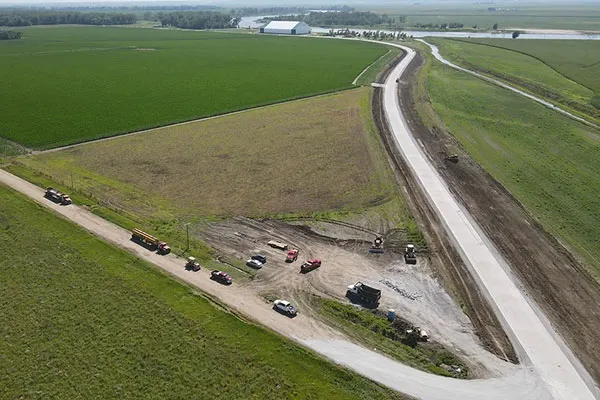
The new road getting paved. A key goal of the project was to facilitate easier access to the terminal for farmers and agribusinesses, providing them with better access to global grain markets. (NEW Cooperative Port of Blencoe)
“The partnership between EDA, Monona County and the state of Iowa helped complete this road project,” Frank Huseman, NEW Cooperative’s operations manager, told Transport Topics. “The port has been in operation for two years, and our hope is to utilize the inland waterway system to enhance economic development in the area, provide an additional form of transportation for our members’ agricultural products and also provide additional options for any material that needs to be transported into this area.”
NEW Cooperative, founded 50 years ago as a farm supply group of agriculture growers, is owned by 8,000 farmers. Based in Fort Dodge, Iowa, the cooperative has 1,000 full-time employees and 66 locations in the state.
“We deal in a commodity business whether it is corn, soybeans, petroleum products, fertilizer, feed, etc. Transportation cost is a key when receiving and delivering products to our members,” Huseman said. NEW Cooperative operates a centralized truck dispatch for 150 owned units, controls grain movements, coordinates dry and liquid fertilizer transport, provides ingredient supplies to high-capacity feed mills and directs 2.4 million tons of feed. It developed the barge terminal in Blencoe to meet growing transportation needs.
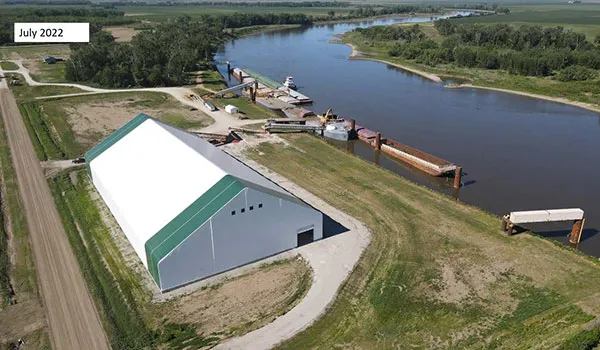
Iowa's Port of Blencoe. The NEW Cooperative, which is owned by about 8,000 farmers, is the owner and operator of the port. (NEW Cooperative Port of Blencoe)
Since opening, the new road and port operations have “created a small intermodal shift in product shipments,” Huseman said.
Before the Port of Blencoe began operating in June 2021, the cooperative was taking 36,000 tons of dry fertilizer annually from ports on the Mississippi River in Dubuque and trucking them to its facilities in Iowa.
“Bringing product up the Missouri River by barge and loading it on to semi-trucks saved us approximately 250,000 truck highway miles last year,” Huseman noted. “When you add in employee cost and fuel costs, the savings add up to nearly $250,000. Our trucks are more efficient; our drivers have less stress and are not working the extended overtime hours to deliver product.”
He noted the Blencoe terminal has so far helped the cooperative save 58,000 gallons of fuel since the trucks travel shorter distances. One barge can handle as much cargo as 70 trucks and more than 16 railcars, according to the Iowa Department of Transportation.
Iowa DOT’s August 2022 State Freight Plan notes the state has 63 barge terminals (57 on the Mississippi and 6 on the Missouri rivers) plus 491 miles of navigable waterways. All of the state’s barge terminals are privately owned and operated. Iowa is defined as a producer-state since it transports more goods over its borders than it imports.
“For the agricultural products that are exported, Iowa producers rely on the highway system to transport goods to major consolidation points like elevators and barge terminals, the inland waterways to ship to Gulf Coast ports via barges and railroads to ship to West Coast ports via unit trains. This trend is shifting, however. Producers (i.e., farmers and/or farming corporations) can achieve transportation economies of scale by transporting their own products using their own or for-hire truck equipment. Iowa farmers are now starting to ship more outputs directly via truck with less focus on moves to local consolidation points and rail terminals,” noted the freight plan.
Want more news? Listen to today's daily briefing below or go here for more info:


